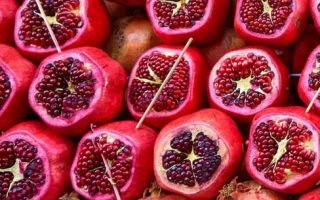Pomegranate is a small tree with shiny narrow-lanceolate leaves and rounded reddish fruits.
Content
Description and composition
The pomegranate culture has been known since ancient times, since the time of Hippocrates.
For treatment, fruit juice, branch and trunk bark, flowers, fruit peel, and pomegranate roots are used.
- The bark of the roots is collected in the fall,
- bark of branches and trunk - in spring,
- flowers - in July,
- fruits - in August.
The leathery pericarp (peel) of the fruit, roots and bark of the pomegranate tree are rich in tannins. The alkaloids peltierine, isopeltzerium and three more alkaloids, which have a strong anthelmintic effect, were found in them.
The bark and roots of pomegranate are poisonous, and therefore it is better not to resort to self-medication with them.
The fruits contain
- sugar - 8-19%,
- organic acids - citric acid,
- nitrogenous and extractive substances,
- fat,
- ash substances,
- phytocides,
- vitamins, including C - 5 mg%.
For what diseases is it used?
The properties of this plant are used in treatment, such as
- anti-inflammatory,
- anthelmintic,
- diuretic,
- choleretic,
- strong pain reliever and
- antiseptic effect.
- The flowers have astringent and anti-inflammatory properties,
- the peel of the fruit has an astringent and fixing effect,
- the bark of roots and branches has a strong paralyzing effect on tapeworms.
Hippocrates (the great physician of Ancient Greece) recommended using pomegranate for stomach pain, and the peel of the fruit for dysentery and for treating wounds. The Arabs used pomegranate for gastrointestinal disorders and headaches.
A decoction of flowers and fruit peel is consumed
- with diarrhea,
- colitis,
- in the form of a poultice, it absorbs inflammatory infiltrates well.
Seed juice is used
- for rinsing during inflammatory processes in the mouth and throat,
- taken internally it soothes stomach pain.
Mode of application
- For dysentery and diarrhea, the following decoction should be prepared: boil 1 teaspoon of pomegranate fruit or flower peel in 1 glass of water, leave for 2 hours, strain. Take 1 tablespoon 3 times a day before meals.
- To reduce stomach pain and inflammation of the oral mucosa and throat: drink ¼ cup of pomegranate seed juice 4 times a day 20 minutes before meals.
- For lotions: boil 2-3 tablespoons of plant flowers with boiling water, wrap in gauze. Tie the pads to the inflamed areas.
Contraindications
There are no contraindications for the use of fruit juice, except for individual intolerance.
As noted above, the bark of the roots and branches should be taken very carefully.
If you are prone to constipation, you should not overdo it with taking a decoction of flowers and peels when treating diarrhea.







